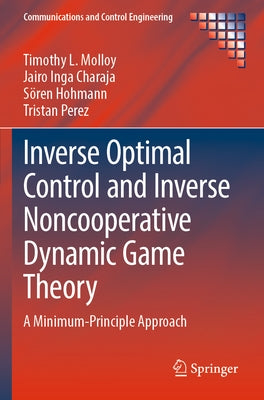- Description
Description
This book presents a novel unified treatment of inverse problems in optimal control and noncooperative dynamic game theory. It provides readers with fundamental tools for the development of practical algorithms to solve inverse problems in control, robotics, biology, and economics. The treatment involves the application of Pontryagin's minimum principle to a variety of inverse problems and proposes algorithms founded on the elegance of dynamic optimization theory. There is a balanced emphasis between fundamental theoretical questions and practical matters.
The text begins by providing an introduction and background to its topics. It then discusses discrete-time and continuous-time inverse optimal control. The focus moves on to differential and dynamic games and the book is completed by consideration of relevant applications.
The algorithms and theoretical results developed in Inverse Optimal Control and Inverse Noncooperative Dynamic Game Theory provide new insights into information requirements for solving inverse problems, including the structure, quantity, and types of state and control data. These insights have significant practical consequences in the design of technologies seeking to exploit inverse techniques such as collaborative robots, driver-assistance technologies, and autonomous systems. The book will therefore be of interest to researchers, engineers, and postgraduate students in several disciplines within the area of control and robotics.
Author: Timothy L. Molloy, Jairo Inga Charaja, Sören Hohmann
Publisher: Springer
Published: 02/21/2023
Pages: 266
Binding Type: Paperback
Weight: 0.88lbs
Size: 9.21h x 6.14w x 0.60d
ISBN13: 9783030933197
ISBN10: 3030933199
BISAC Categories:
- Mathematics | Calculus
- Technology & Engineering | Automation
- Mathematics | Game Theory
About the Author
Dr Timothy Molloy received his B.Eng. and Ph.D. degrees from the Queensland University of Technology (QUT) in 2010 and 2015, respectively. His Ph.D. focused on detection and estimation in stochastic processes. From 2016 to 2019, he was a Research Associate then Advance Queensland Research Fellow at QUT investigating forward and inverse problems in optimal control and dynamic game theory. Since 2020, he has been a Research Fellow at the University of Melbourne on an AUSMURI project investigating neuro-inspired perception, navigation, and spatial awareness for autonomous robots. His research interests include inverse problems in optimal control and dynamic game theory, and information-theoretic inference and decision-making for robots and autonomous systems. Dr Molloy is the recipient of a QUT University Medal, a QUT Outstanding Doctoral Thesis Award, a 2018 Boeing Wirraway Team Award, and an Advance Queensland Early-Career Research Fellowship from the Queensland Government and Boeing.
Dr Jairo Inga Charaja received his B.Sc. (2011) and M.Sc. (2014) degrees in electrical engineering and information technology from the Karlsruhe Institute of Technology (KIT), Germany. From 2015 to 2020, he was a research assistant at KIT investigating optimal control and dynamic game theory as a means to model human-machine shared control systems. He graduated summa cum laude with a Ph.D. (2020) at KIT on inverse optimal control and inverse reinforcement learning methods for parameter estimation in dynamic game theory. Since 2020, he has been the leader of the Cooperative Systems research group at the Institute of Control Systems (KIT), where he investigates control-oriented modeling and identification of human behavior as well as the design of cooperative controllers in human-machine systems.
Dr Sören Hohmann is director of the Institute of Control Systems and full professor of system dynamics and control at the Karlsruhe Institute of Technology (KIT). He is also a director of the Research Center for Information Technology (FZI). He has over 25 years of experience in modeling, design and control of dynamical systems in academia and industry. He studied electrical engineering at the Technische Universität Braunschweig, University of Karlsruhe and Ecole Nationale Supérieure d'Electricité et de Mécanique (ENSEM) and earned a Ph.D. on nonlinear discrete time systems. Afterwards, he worked for BMW in various advanced development positions as lead engineer and executive positions, including the area of driving dynamics, active safety and driver assistance systems. He is a member of the board of the European Energy Research Alliance smart grid, Member of the Board of the Council for Research and Promotion of Young Scientists (KIT) and Editor of the journal at-Automatisierungstechnik, consultant of several ministries in Germany and Austria, and works as a consultant for numerous companies in Germany. His main research and teaching interests are in the area of system dynamics and control emphasizing cooperative and shared control for human-machine systems, control of energy systems and guaranteed system design. He has over 200 publications and received several best paper awards.
Dr Tristan Perez has over 20 years of experience working in areas of system modelling, inference, and decisions & control. He has worked in academia and industry across different areas such as maritime, aerospace, energy and resources, robotics, business decision support, and network-centric warfare. He is currently with Boeing Defence Australia. He previously was a Professor of Robotics and Autonomous Systems at the Queensland University of Technology (Australia) and has also held academic appointments at The University of Newcastle (Australia), The University of Queensland (Australia), and The Norwegian University of Science and Technology (Norway). Dr Perez completed a Ph.D. in 2003 with focus on constrained control of uncertain systems at the University of Newcastle (Australia) and holds a degree in Electrical Engineering with specialisation in control systems from the University of Rosario (Argentina). Dr Perez is also the author of Ship Motion Control in Springer's Series on Advances in Industrial Control.



